It’s still one of the most talked-about final scenes in the history of television; it most likely always will be. For nearly five minutes on the night of June 10, 2007, viewers of HBO’s game-changing crime drama The Sopranos sat on the edge of their seats, biting their nails, wondering if Tony Soprano, head of the notorious New Jersey crime family that bore his name, would finally meet his doom—in a diner. The tension builds from the first moments of the scene, and it never lets up.
It all unfolds to a background supplied by Journey.
The riveting scene begins with Soprano, played by the late James Gandolfini, entering the eating establishment and surveying the dining room nervously. There are so many who’d like to see him dead. It can happen at any time, any place. Will this be the night? Is there an enemy sipping coffee at the counter, waiting to pounce?
He takes a seat alone at a table and begins flipping through the selections on the mini-jukebox. The song playing, at first, is Little Feat’s “All That You Dream.” Tony skips past Mary Hopkin’s “Those Were the Days” and Jay and the Americans’ “This Magic Moment.” We see the fry cook flipping burgers. Tony passes on Sawyer Brown’s “Somewhere in the Night” and Heart’s “Who Will You Run To.” He looks toward the door to make sure no one potentially dangerous is entering.
Then he sees the song that he wants. He pulls a couple of coins out of his pocket, checks out the baseball-capped guy walking in, puts the money in and presses a couple of buttons. As Little Feat fades, we hear the opening piano notes of “Don’t Stop Believin’,” the 1981 hit by 2017 Rock and Roll Hall of Fame inductees Journey. Tony relaxes long enough to look at the menu.
Soon, his other family, his real family, begins to enter: wife Carmela (Edie Falco) and son A.J. (Robert Iler) make small talk, share a plate of fries. Tony never stops looking around. Will the next guy walking in be the one who blows him away? We see Meadow Soprano (Jamie-Lynn Sigler), Tony and Carmela’s daughter, outside, running toward the diner.
Related: What else was happening on the charts in 1981?
The words “don’t stop,” playing for all in the diner, are the last we hear. It never makes it to “believin’.” The screen fades to black; it remains black for several seconds, to the sound of silence. The credits roll.
Was that it? It was. We will never know if Tony and his family got to finish their fries.
The highly anticipated episode, “Made in America,” the program’s 86th, written and directed by the creator of The Sopranos, David Chase, was all about tension and unfinished business. Having seen Tony Soprano whack dozens of people over the course of six seasons, viewers wondered if Chase would do him in at the end. Many viewers fumed at the finale; many others thought it was perfect. The ending was discussed at great length, in great depth: What did it mean?
Chase left it up to each viewer to decide. His response to those who’ve continually asked him: “There’s more than one way of looking at the ending. That’s all I’ll say.” (For the 20th anniversary of the series’ January 10, 1999 debut, Chase did an extensive interview with the New York Times.)
The use of “Don’t Stop Believin’” is ideal for the scene. Written by Journey members Steve Perry (vocals), Jonathan Cain (keyboards) and Neal Schon (guitar), the song was recorded by the band—which also included bassist Ross Valory and drummer Steve Smith at the time—at Fantasy Studios in Berkeley, California, in 1981. Released as a single from the group’s seventh studio album for Columbia Records, Escape, it reached #9 on the Billboard Hot 100.
Related: Our Album Rewind of Escape
It very well might have gone down as just another classic rock anthem, but due to its use in The Sopranos, the song’s stature grew beyond its original audience to become a popular culture phenomenon, used in other TV programs, in video games and by sports teams, covered by everyone from the Chipmunks to the cast of Glee, whose own version became a massive hit in the United States and several other countries.
As of 2009, Journey’s “Don’t Stop Believin’” had sold over three million downloads on iTunes, the biggest-selling digital song of the pre-digital era. As of this year its total digital sales had approached seven million.
The funny thing about all of that is, it almost didn’t make it to the show. Journey’s Steve Perry was initially reluctant to lend it to The Sopranos for the finale, afraid that if Chase were to kill off the show’s star, “Don’t Stop Believin’” would forever be linked to the demise of a beloved—if brutal—TV character. Only after he was assured that viewers would not see Tony take a bullet to the head did Perry give his blessing.
Related: Journey’s Rock and Roll Hall of Fame’s Class of 2017 induction
At its surface, “Don’t Stop Believin’” is a very familiar tale, upbeat in demeanor and bathed in mainstream ’80s production, of a small-town girl and a city boy: “For a smile they can share the night.” But there is an element of mystery and danger lurking. Perry sings:
“Working hard to get my fill
Everybody wants a thrill
Payin’ anything to roll the dice
Just one more time
Some will win, some will lose
Some were born to sing the blues
Oh, the movie never ends
It goes on and on, and on, and on”
It continues…
“Strangers waiting
Up and down the boulevard
Their shadows searching in the night
Streetlights, people
Living just to find emotion
Hiding somewhere in the night”
Will the city boy and small-town girl find salvation? Will the Soprano family? Is Chase giving us hope?
The song ends with Steve Perry and the band repeating the chorus three times:
“Don’t stop believin’
Hold on to the feelin’
Streetlights, people”
It’s up to you, to all of us, to provide the outcome, to believe or stop beleivin’.
Gandolfini died June 19, 2013, at age 51. The Sopranos is available here.

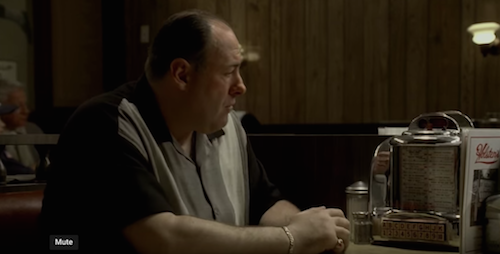
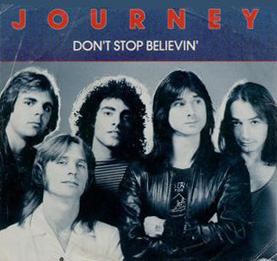
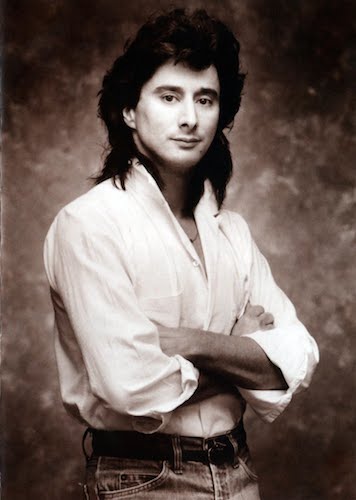

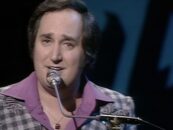
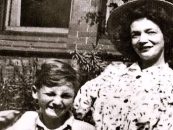
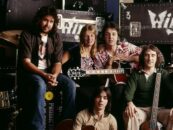
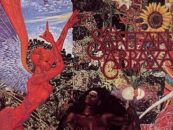

5 Comments so far
Jump into a conversationSteve Smith was the drummer of/on record, not Deen who joined in 1998
Thanks for pointing that out; we’ve made the correction.
You spelled Ross Valory’s name incorrectly.
Fixed, thanks.
I knew the story about how Steve Perry was reluctant to let the show use the song. It turned out to be very profitable for all involved in the end. Plus, no one got whacked!`